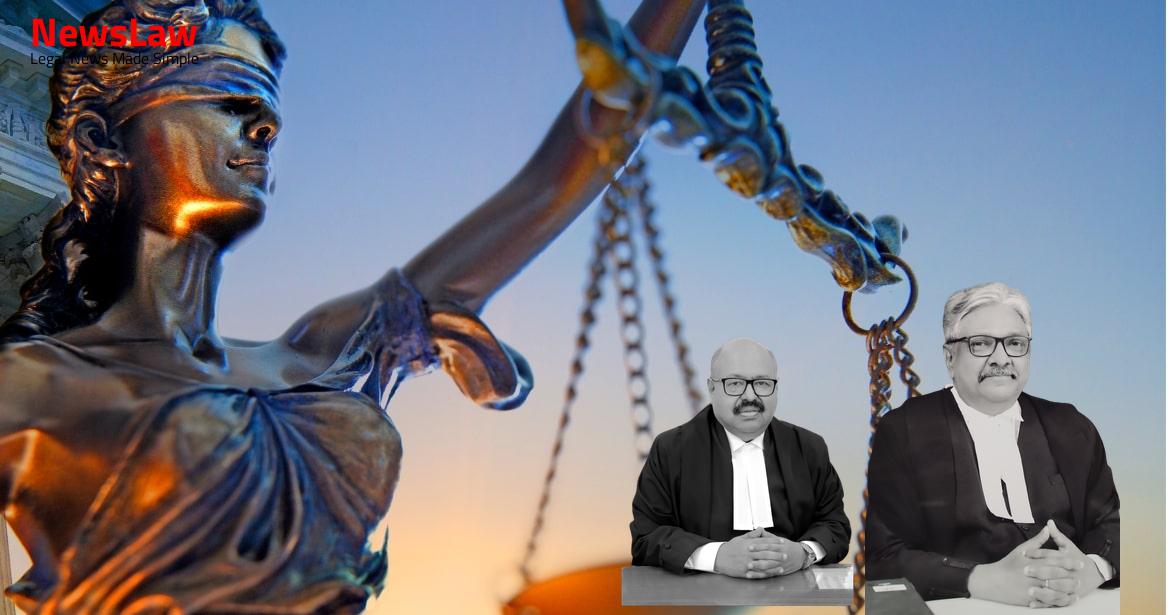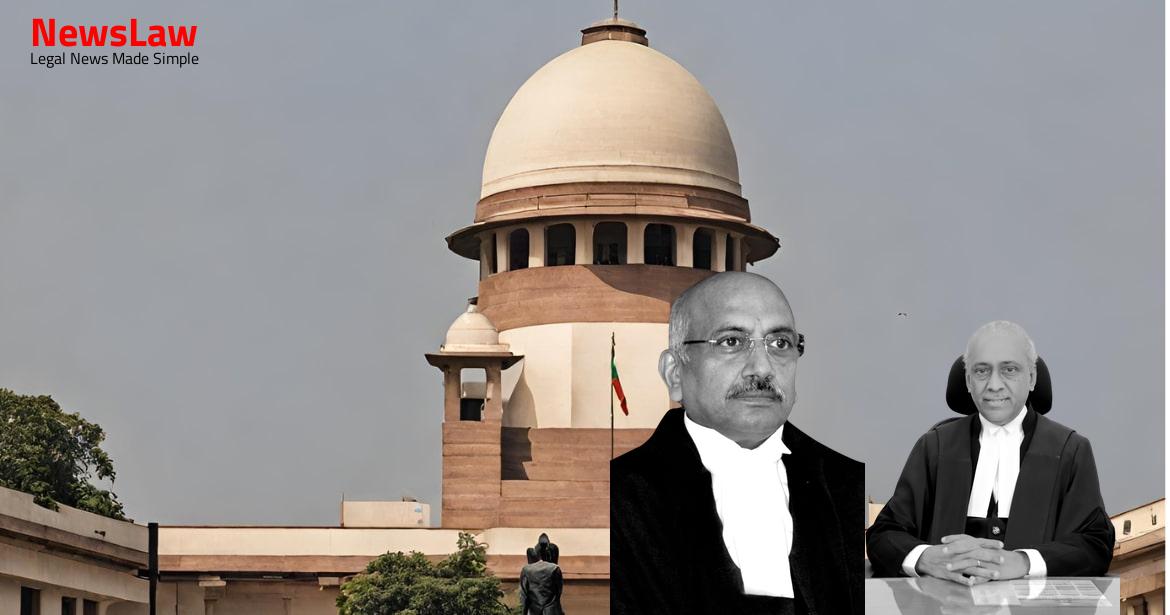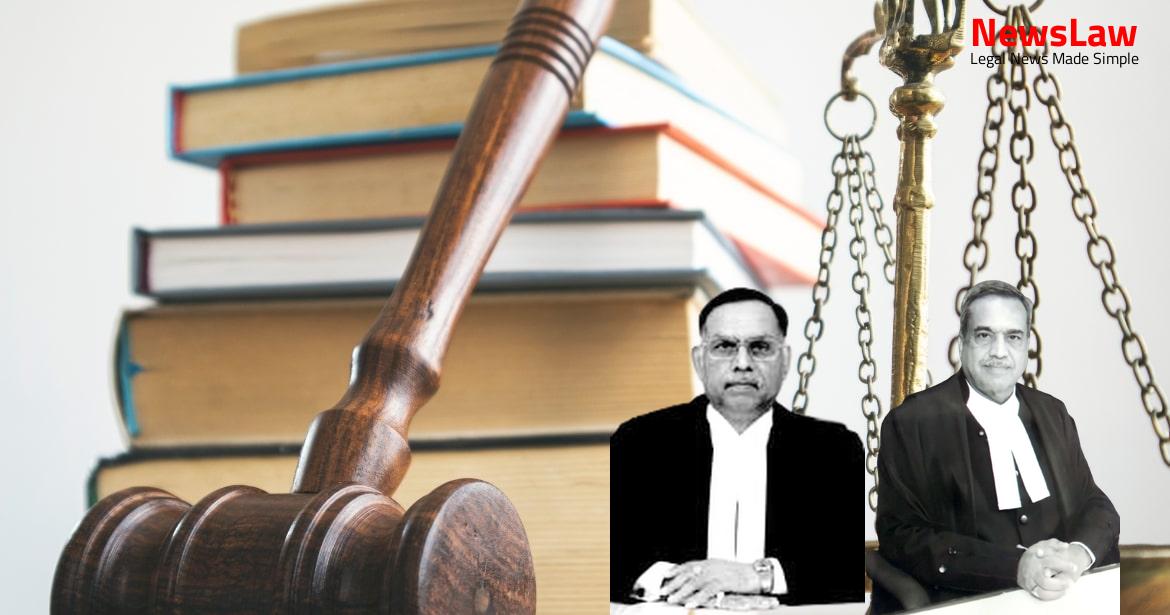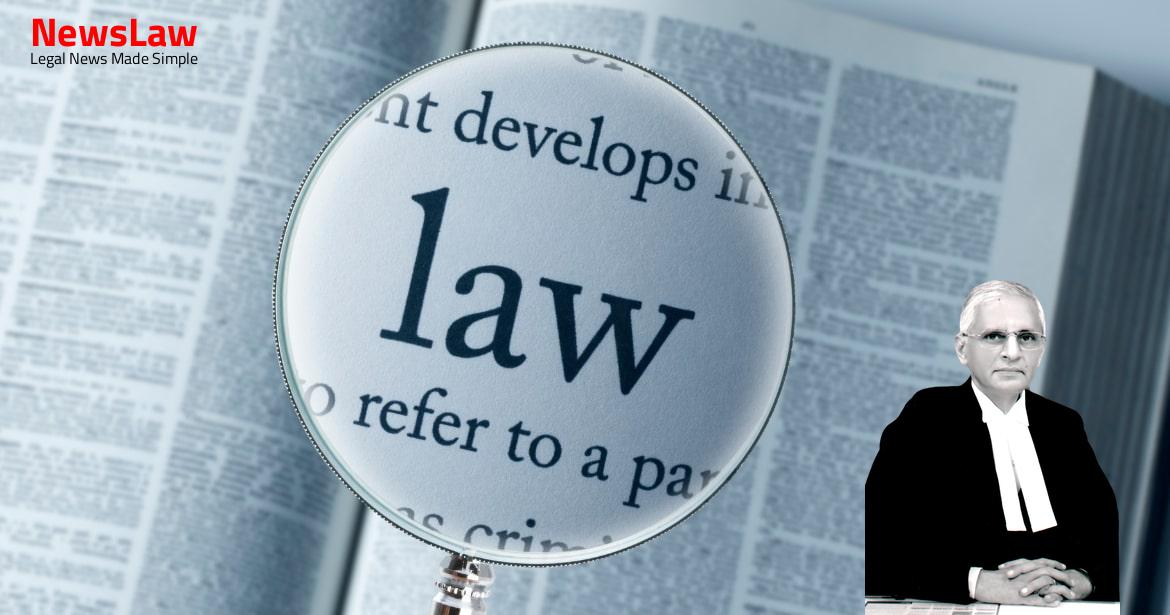Delve into the detailed legal analysis conducted by the court in a notable marriage dissolution case. The court’s meticulous examination of provisions related to divorce, cruelty, and limitations sheds light on the complexities of matrimonial law. Stay tuned to unravel the in-depth legal scrutiny that guided the final judgment in this case.
Facts
- The High Court overturned the dissolution of marriage between the appellant and the respondent.
- The original decree was passed under Section 13(1)(ia) of the Hindu Marriage Act, 1955.
- The High Court’s decision reversed the decree based on specific grounds.
- The Family Court allowed the petition by its decree dated 23.07.2004.
- An appeal was carried by the respondent before the Madras High Court under Section 19 of the Family Courts Act, 1984 and it was filed on 09.09.2004.
- The appellant and the respondent were married as per the Hindu rites and customs on 29.08.1999.
- He was served with the notice in the matter in May, 2005.
- Since the period for filing an appeal by the respondent had expired, the appellant re-married on 31.10.2004 based on the decree of dissolution dated 23.07.2004.
Also Read: Judicial Analysis on Back Wages in Employee Caste Verification Case
Arguments
- The appellant’s counsel argues that the appeal should be treated as having been presented within the meaning of Section 15 of the Act, despite filing on 09.09.2004.
- The appellant’s father-in-law passed away on 03.02.2001, emphasizing the strained relationship between the parties.
- The appellant’s counsel challenges the High Court’s reliance on Section 29(2) of the Limitation Act, claiming that the sanctity of the marriage is lost and irreparable.
- The appellant’s counsel refers to a case under Section 28 of the Hindu Marriage Act, questioning the basis of the High Court’s decision.
- Various contentions made by the appellant’s counsel regarding the conduct and behavior of the respondent in the marital relationship are highlighted.
- Counsel discusses the respondent’s failure to file for restitution of conjugal rights, pointing to a lack of genuine interest in reconciliation.
- Contradictions in the High Court’s findings and the appellant’s dissatisfaction with the judgment overturning the Family Court’s decision are mentioned.
- Arguments regarding the necessity to adhere strictly to the provisions of the Family Courts Act, especially Section 19, are presented.
- The appellant’s counsel criticizes the High Court’s finding on the respondent’s willingness to rejoin the appellant, citing various dates and events as evidence.
- Respondent is blameless and circumstances beyond her control led her to stay at her parental house after finding out she was pregnant.
- No evidence for the alleged threat to commit suicide, only normal wear and tear in the marriage.
- The High Court correctly concluded that there was no cruelty towards the respondent after exhaustively discussing the matter.
- The respondent’s father passed away, adding to her plight as a blameless individual rushed into marriage by her husband.
- The Family Court had no grounds to grant a decree of dissolution as the pregnancy was complicated and the respondent fulfilled her obligations despite staying at her parental house.
Also Read: Interpretation of Suspension Rules in Employment Case
Analysis
- The judgement discusses the various provisions of the Hindu Marriage Act and the Limitation Act in the context of matrimonial matters like divorce and restitution of conjugal rights.
- The appellant’s appeal for divorce is found to be within time despite the respondent’s argument.
- The Family Courts Act and its relation to matrimonial matters is highlighted, emphasizing the need for specialized institutions for reconciliation.
- The judgement considers the aspect of cruelty in marriage and the importance of reconciliation efforts.
- The legislative intention behind the provisions of Section 29(3) in the Limitation Act is explained.
- The discussion also touches upon the concept of irretrievable breakdown of marriage.
- The Court examines the appellant’s conduct and the timeline of events leading to the appeal for divorce.
- The importance of obtaining certified copies of decrees for appeals is emphasized.
- The role of Article 142 of the Constitution in ensuring complete justice to the parties is mentioned.
- The judgement concludes by affirming the findings of the High Court regarding the lack of cruelty alleged by the appellant.
- Section 20 of the Family Courts Act overrides any inconsistent provisions in other laws
- Section 29 of the Limitation Act deals with savings and applicability of special or local laws
- Section 15 of the Family Courts Act imposes a time limit on challenging a divorce decree
- The case of Lata Kamat is referred to for interpretation of relevant provisions
- Arguments on applicability of Section 29(3) and Section 29(2) of the Limitation Act are presented
- The contention was advanced that the applicant was entitled to a copy free of cost and hence the time taken to obtain a certified copy cannot be excluded.
- Section 363(1) of the Criminal Procedure Code specifies that when the accused is sentenced to imprisonment, a copy of the judgment should be given to him immediately after the pronouncement of the judgment free of cost.
- Section 15 of the Hindu Marriage Act allows the applicant to receive a copy free of cost, but does not specify the time within which the copy should be delivered.
- Section 23(4) does not support the argument that the time required to obtain the certified copy should not be excluded.
- A certified copy may be necessary for an appeal despite the provision of a free copy under the Family Courts Act.
- The Rule made under Section 21 of the Family Court Act reinforces the requirement for a certified copy.
- The period of limitation for those governed by the Indian Divorce Act is 30 days.
- The tie between the parties has broken beyond repair
- Dissolution of marriage is in the interest of justice
- Decision not based on approval of appellant’s conduct or judgment over respondent’s conduct
- Respondent is blameless in the matter
- Unavoidable to consider dissolution of marriage as the best course open in the interest of justice
- The marriage has become dead – a point of no return
Also Read: Legal Analysis of Assignment and Ratification in Property Law
Decision
- The appellant will continue to be liable to pay Rs.7000/- per month to the respondent until the amount is paid as specified.
- The High Court judgment is affirmed, and a decree of dissolution on the ground of cruelty by the respondent is refused.
- The marriage between the appellant and respondent is declared dissolved under Article 142 of the Constitution.
- The appellant is required to pay a sum of Rs.20,000,00/- to the respondent within eight weeks via a demand draft.
- The dissolution of the marriage is without prejudice to the son’s rights born in the marriage regarding property rights.
Case Title: N.RAJENDRAN Vs. S.VALLI (2022 INSC 140)
Case Number: C.A. No.-003293-003293 / 2012



